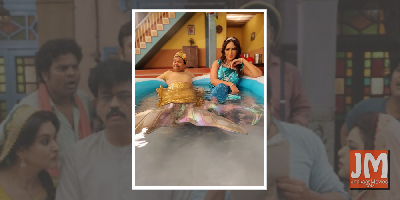 Aan Tiwari honoured with Best Child Actor award for Baal Shiv
Aan Tiwari honoured with Best Child Actor award for Baal Shiv Ghategi rahasymayi ghatnaye!
Ghategi rahasymayi ghatnaye! Amazon Prime Video unveils the 2021 Festive Line-up; brings a heady mix of Indian and International titles on the service
Amazon Prime Video unveils the 2021 Festive Line-up; brings a heady mix of Indian and International titles on the service Release: Music video of, Yeh Haalaath, from Mumbai Diaries 26-11
Release: Music video of, Yeh Haalaath, from Mumbai Diaries 26-11 Bhumi Pednekar feels she shares feel-good value with Akshay Kumar on screen
Bhumi Pednekar feels she shares feel-good value with Akshay Kumar on screen
It cost a life to finish film labour mafia!

BY VINOD MIRANI
The unions representing certain sections of workers as well as the trade associations are meant to work for the benefit of their members, as in whichever group of worker members they represent. At least, that seems to be the purpose they are formed with. The idea is to guard the workers from being exploited by their employers.
The film industry in India and more so in Mumbai, is replete with unions and associations. An association is meant to be the umbrella body, to unite its members, and speak in one voice for its members with common interests. The union is for the workers, the blue collar.
The Mumbai-based Hindi film industry has as many as four associations representing the Hindi film producers! So much for unity and single umbrella. These producers' associations create divisions among producers rather than unite them. That is because, each of these four define the standing and status of its producer members. For example, the Film and Televisions Producers' Guild has on its roster, the elite of the lot. The membership here is not open to all as it is only by invitation.
Then there is Indian Film and Television Producers Council (IFTPC), followed by Indian Motion Picture Producers Association (IMPPA), Western India Film Producers Association and, lastly, the Marathi Chitrapat Mahamandal, which represents the regional Marathi filmmakers.
However mighty these filmmakers' associations may be in status and financially, they have to contend with a number of cine workers associations at various stages. There is an association for each craft involved in the process of filmmaking like directors, musicians, art directors, fighters, Action Dummy Effects (action dummy players), makeup artists. All these associations were controlled by FWICE (Federation of Western India Cine Employees), the apex body of the workers' unions.
As the things in the industry worked over the years, it has always been vulnerable to outside factors, some natural and some manmade. And, the manmade factors have usually come from these various workers' associations. Guarding the interests of their member workers is fine and justifiable but, often, these associations tended to take the law into their own hands. There are cases of associations' highhandedness, causing disruptions or even cancellation of a shooting under progress. Only their card bearing members could work on a film set.
Some workers associations had assumed so much power that not only the film and television programme producers, but even their own members suffered. There was victimization and exploitation of the members. The associations controlled their careers as well as the earnings. Those who came to do menial work on film sets were poor people and their terms were akin to a daily wage earner.
The umbrella body of workers unions or associations, FWICE, made the very basic task of enrolling a new member impossible by demanding Rs 50,000 as membership fees. On top of that, for the producers, it was mandatory to employ FWICE members and pay their dues and not the workers directly but the federation! For doing this unwanted service, the workers were deprived of 2 per cent of their earnings, charged as the commission by the federation.
According the IMPPA President, T.P. Agarwal, FWICE has been controlled by certain coterie since 2015 which has made it impossible for a needy aspirant to find employment. Any worker wanting to contest even the elections for a post in an association had to pay a fee of Rs 50,000 outright! I don't think even the national elections costs so much to contest!
The filmmakers had no alternative but to tow the lines of FWICE. On the day of a shooting, nothing matters more to a producer than to complete the day's schedule. If the unions, with the help of goons, descended on the sets and found a nonmember working, it threatened not only to top shooting but also went on to vandalize the set. They thought it wiser to comply and ended up paying huge bribes in cash to carry on with the work.
In 2017, among others, producer Vipul Amrutlal Shah, having had enough of the highhandedness of these unions, approached the Competition Commission of India (CCI) to take up the matter. The respondents to his complaint involved all workers association/ unions. The commission ruled against the associations and unions concerned which has so far been disregarded by these associations. The CCI could pass its observations but had no machinery to implement.
The apex body, FWICE, had become as powerful as any mafia which, with no stakes of its own, was minting crores of rupees and terrorising the film industry as well as its members.
There has to be an end to all kinds of tyranny and, the last nail in the coffin was the suicide committed by an art director, Rajesh Sapte, whose suicide note held a certain Rakesh Mourya, the treasurer of the Film Setting Mazdoor Union, for constant harassment holding him responsible for this tragic step. Sapte, in his suicide note, stated that due to Mourya he lost many assignments as the fellow member workers were stopped from working with him.
And, what is the status of the union leaders? They are all absconding except one, the main culprit, Rakesh Mourya, who has been arrested. But, while their reign lasted, they have collected millions in personal wealth and own a number of properties in the distant Mumbai suburbs while their member workers continued to live in rented hole-in-the-wall arrangements! Besides this, according to Anil Nagrath, the secretary of IMPPA, the FWICE would have a fund of over Rs 100 crore, none of which has been audited for many years, nor submitted to the Labour Commission.
The police as well as the Labour Commissioner have taken a serious view of the whole case and held the activities by the unions illegal giving rights to the filmmakers to engage whichever technician they wish, doing away with any union affiliation and deposit their wages directly into the workers' accounts.
The saddest part is that Rajesh Sapte was forced to end his life because of the very people who were meant to protect his interests, not take his life.
(Vinod Mirani is a veteran film writer and box office analyst. The views expressed are personal)








